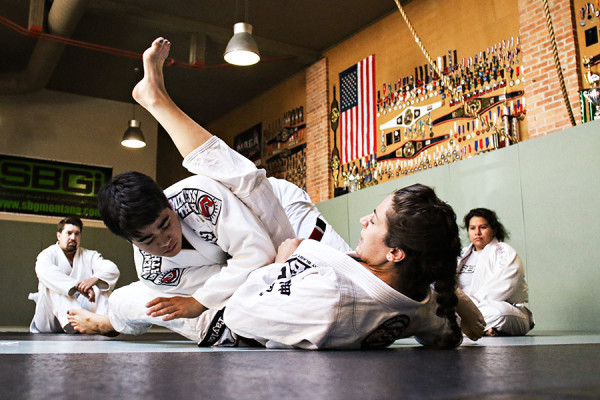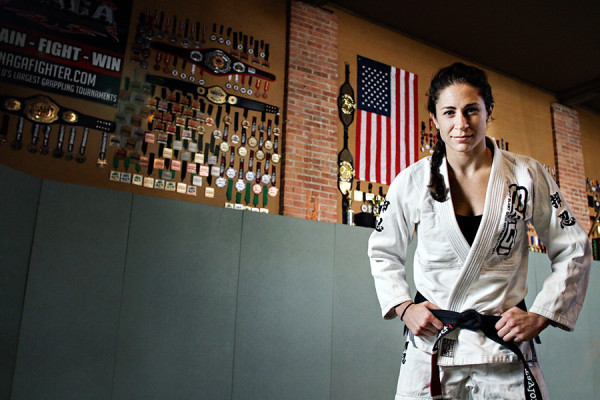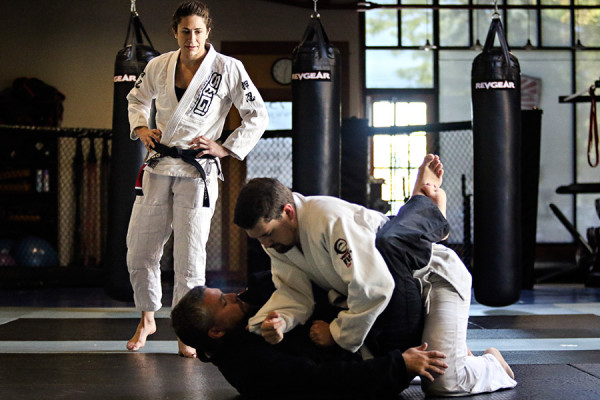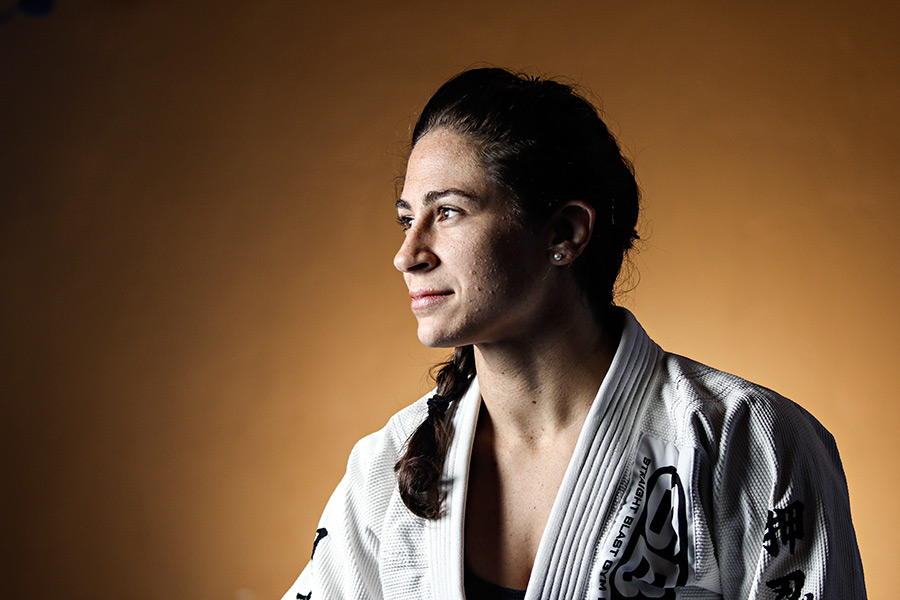There’s an easy rhythm to the class at Straight Blast Gym International in Kalispell, six people splayed or rolling around on the floor while a calm, steady woman gives clear instruction.
Standing at 5-foot-9 with her dark hair pulled back into a braid, Leah Taylor looks at home teaching Brazilian jiu-jitsu, wearing a white, ankle-length gi with insignia identifying her home gym.
But the key aspect of Leah Taylor’s confidence – and her uniform – is the black belt tied around her waist.
It’s all a puzzle, this martial art that mixes grappling, self-defense, and combat aspects, and Brazilian jiu-jitsu is making its way into more homes across the country each year with its important role in mixed-martial arts fighting, or MMA.
Taylor, the only woman in Montana with a black belt in Brazilian jiu-jitsu, hopes to show more people, especially other women, the solutions to the physical riddle the sport presents.
While teaching about posture and the importance of controlling your opponent, Taylor gave easy yet intense advice to a pair of men grappling on the mat.
“Everything he does is wrong,” she said, not about that particular student, but about all opponents in general. “We have an answer for everything.”

To an outsider, the world of Brazilian jiu-jitsu (BJJ) can be an odd place, one in a constant state of push and pull, where intricate movements are just as important as crowd-pleasing sweeps and rolls, and a few seconds of intense pain can end a 10-minute stalemate between opponents.
It can be frenetic and it can be slow, two fighters intent on scoring more points than one another or ending the match with a submission move that can break joints or end in unconsciousness if the victim doesn’t tap out in time.
For fans of MMA fighting, jiu-jitsu is often what’s happening while the fighters are tangling on the mat, trying to use their opponent’s body as a tool for victory.
At Straight Blast Gym International (SBGI), jiu-jitsu is the bread and butter program, complemented by striking classes, women’s-only boot camp classes, and the Yoga Room next door.
Unknown amounts of sweat, blood, and tears have been spilled in this gym as students continue their quest to learn more, be stronger, be better. For many, the realization of these goals will be personal and perhaps private; for Taylor, reaching goals is more concrete.
At the end of August, Taylor won gold at the International Brazilian Jiu-Jitsu Federation’s Atlanta Summer International Open. She won not only her weight class – medium heavy – but also the general open competition, where weight classes are ignored.
It was her first tournament as a black belt, though her successes have followed her no matter the color around her waist. At blue belt, two years after beginning her jiu-jitsu training, she became a world champion in her weight class at the Mundials or “Worlds,” touted as the toughest BJJ tournament on the planet.
At purple belt – the next level up from blue belt – Taylor took silver at Worlds, but only because her opponent fell on her leg, injuring Taylor’s knee.
In fact, success follows Taylor at most turns. At 32, she has earned her bachelor’s degree in biology, three master’s degrees related to teaching science, a couple years of teaching at schools in Portland, Oregon, and a karate black belt. She has taught snowboarding lessons for 16 years, and used to work in Alaska for the U.S. Forest Service as a wilderness and educational ranger.
She was always an athlete, pursuing gymnastics, martial arts, and even competitive diving, as a direct result of her mother’s influence.
“My mom didn’t do (sports) growing up, so she wanted us to have the opportunity,” Taylor said.
Her first experience with martial arts was in karate, which she described as more of an art form for her than a fighting form. Eventually, she earned her black belt, but after leaving home in Rome, New York, to go to college and eventually her adventures out West, she dabbled in whatever martial art was offered, like judo or aikido.
In Ketchikan, Alaska, Taylor wandered into what she thought was a taekwondo class, and then realized it was MMA. There were no other women, but she dove in and subsequently got knocked off her feet. The striking was new to her, but for some reason, the grappling felt right.
“There are things you can do just enough at the beginning that they make you think, ‘I could be good at this if I worked at it,’” Taylor said about discovering jiu-jitsu.

While working summers as a ranger in Alaska, Taylor would spend her winters in the Flathead Valley, teaching snowboarding at Whitefish Mountain Resort.
“If I could’ve snowboarded all year, I probably wouldn’t have gotten into jiu-jitsu,” she said.
It was here she met Travis and Kisa Davison, the owners of SBGI in Kalispell and now Whitefish. In 2009, SBGI was a fledgling gym locally, and Taylor sought out Travis for his jiu-jitsu experience.
When she got to the gym, there were five or six guys rolling – the term used to describe jiu-jitsu sparring – and Taylor expected to find what she’d found in other gyms around the country: a bias against female martial arts athletes.
Like many other sports, BJJ is male dominated. Coaches are typically male, and classes have few women. Taylor experienced this lopsided makeup in real time, grappling and rolling with male training partners, many of whom didn’t want to be seen losing to a woman.
“The first time I even rolled with another woman was in my first tournament, and that was in Helena,” Taylor said.
It wasn’t until she came to Montana and joined up with SBG International for the winters that Taylor felt she’d found her home gym. In Travis Davison, who is also the vice president of SGB International, she found a kindred spirit, the kind of coach who treated her with respect, the kind she wanted to work hard for.
“He gave me my first stripes and my first belt,” she said. “I was moving around a lot and it was hard to make connections. You feel kind of ghost-like.”
Davison remembers Taylor’s first phone call, in which he spent at least half an hour convincing her to come to his gym, that it would be a safe place for a woman athlete.
“She was very cautious, being a woman in a male-dominated sport,” Davison said. “There have been lots of documented examples where women have been mistreated in their gyms.”
Kisa Davison, who runs the Yoga Room and certain classes at SBG, said there is a specific focus at SBG to make jiu-jitsu more accepting of women. Not only is it a personal issue she faces as a female athlete herself – Davison holds a blue belt in BJJ – but it’s an issue the Davisons’ 13-year-old daughter, Stella, will deal with in her pursuits. Bringing Taylor on board as a coach will affect change, Kisa Davison said.
“It’s still a very new concept to have women in jiu-jitsu, but even jiu-jitsu as a widely accepted sport is also very new,” Kisa Davison said. “I need my daughter to see that there is a place for her, and what that looks like isn’t her pretending to be a man, but her being herself. What’s great about having not just a female black belt as a coach but Leah in particular, she is very warm and she’s very approachable and she takes a lot of joy in the sport.”
In that same vein, Travis Davison said one of the most memorable aspects of Taylor’s training style is her other trademark: laughing.
“She just giggles and laughs so much while she’s rolling, and while she’s sparring competitively,” he said. “It’s almost like the worse things go for her, the more she laughs. She’s just so chill. The fact that she can giggle in that environment and laugh and have fun, I think it gives her an edge.”

After the recession hit and Taylor’s positions within the Forest Service were eliminated, she moved to Portland, Oregon, to become a science teacher. While there, she trained with Davison’s coach at SBGI headquarters, earning her purple belt.
Taylor trained with another of SBGI’s rising stars, Amanda Diggins. Diggins is also a black belt in BJJ, and a full-time coach with the gym. She took gold at the IBJJF American National Tournament this year, as well as the BJJ Pro in Santa Cruz, California.
The two grappled so often that their fights became more of a choreographed sequence, they knew each other so well.
“The only other woman I’ve trained with is Leah,” Diggins said in an interview with the Beacon last week. “It’s always a benefit, being able to train with a high-level female, but they’re kind of few and far between.”
Taylor moved to Kalispell to work for the Davisons’ gym full time in October. The Portland gym has attracted more female athletes, but no one at Taylor’s level, Diggins said.
“Leah is just a fantastic person. She’s a great competitor, obviously, and she’s a great asset to have in the gym,” Diggins said. “She’s super intelligent and has worked really hard to be where she is right now, and it’s just really cool.”
Davison said he’s aware of the effect Taylor has at his gym. Not only does she have a wealth of knowledge and experience, but she’s also fearless. Having had to train with men due to a dearth of women in the sport, she’s working on perfecting her technique, which can still win out even if she’s facing an opponent with more strength and quickness.
“She used to make men quit,” Davison said. “She used to run dudes out of here like crazy.”
It wasn’t a bad thing. Jiu-jitsu is like therapy, he said, and many men walk through the doors assuming everything society has told them about masculinity is true, that they have a natural fighter living at their core. Figuring out that this isn’t the case, that they have to work hard to earn skills on the mat, can be a tough lesson.
“Jiu-jitsu is the kind of therapy that makes you deal with your ego,” Davison said. “Instead of confronting it, they quit. Women usually progress faster.”
Taylor may have settled in Kalispell, but her goals continue to evolve. She is training for the upcoming 2016 Worlds competition, where she hopes to bring home the gold as a black belt. She’s also making the transition into MMA, and hopes to fight locally.
To help with this transition, Taylor has worked on the corner team for Aisling Daly, a 27-year-old Irish UFC fighter ranked 15th in the world for the women’s strawweight level, and will corner for Daly again in her October fight in Dublin. Daly is also an SBG International fighter, as is Conor McGregor, the UFC’s current featherweight champion and coach on the hit show, “Ultimate Fighter.”
Entering the world of MMA is just another way to keep learning and progressing as an athlete, Taylor said, and the experience will only help her future pursuit of running her own SBGI gym.
She also wants to start a women’s competition team for jiu-jitsu and MMA, with local and regional athletes training together. Already at the Kalispell gym, she’s running a women’s-only jiu-jitsu practice, each Saturday at 1 p.m.
“For women, the community part is really important, the social aspect is important,” Taylor said. “When you try to make women move and act like men, it just doesn’t transfer well.”
When it comes down to it, Taylor has high expectations for herself, and she expects the best from others as well. She’s adept at recognizing what that means for her students, Kisa Davison said, as well as for herself.
But despite the medals she’s already hung around her neck and the potential belts she could win the in the future, Taylor’s biggest reward from jiu-jitsu is a rare prize with which nearly all humans could identify: Finding a place of perpetual joy, a place she thrives and belongs.
“I really love this sport,” Taylor said. “The problems you’re presented with, you want to unlock that, and it just presents three more.”
